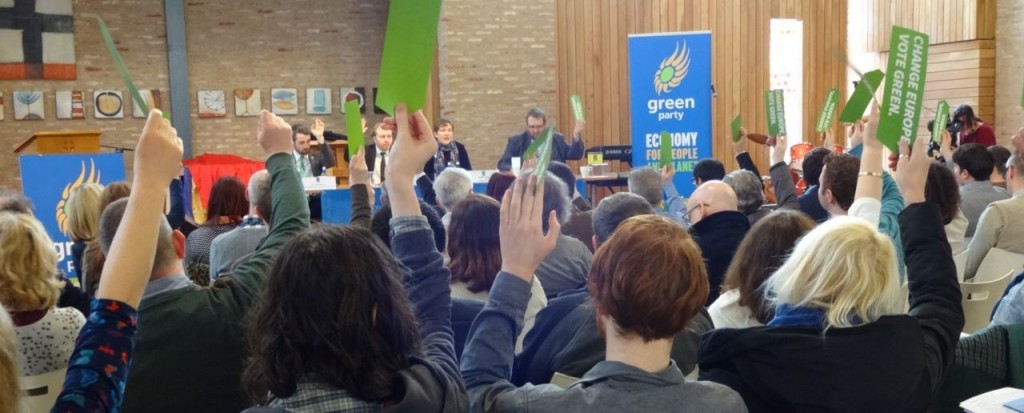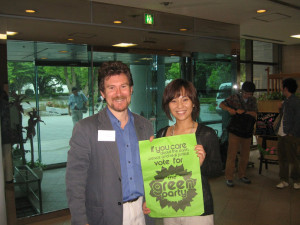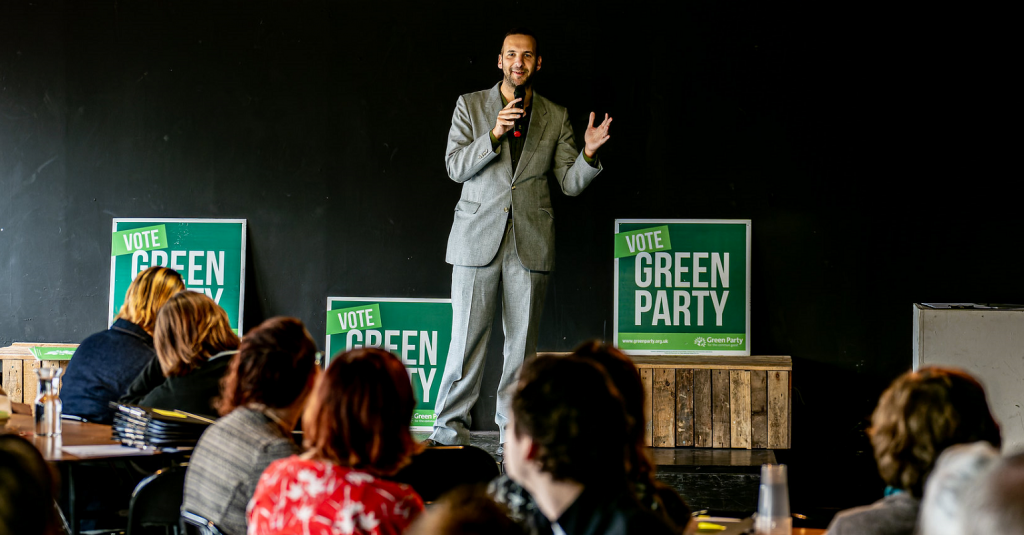Beyond “arguing about flags”: a cup of tea with Councillor John Barry

In England and Wales we Greens like to think of ourselves as offering something different. We often talk of ‘breaking the mould’ of British politics, of offering a ‘real alternative’ to the neoliberal consensus. Describing this to Professor John Barry, Green Party Northern Ireland councillor and Queen’s University lecturer, I then naively asked: “So how does all this fit into the sectarian backdrop of Northern Ireland politics? How do the Greens here fit in with Stormont politics?” His answer was simple and delivered with a smile: “We don’t”.
For decades, perhaps since the country’s inception, sectarianism has crowded out many important debates within Northern Irish politics. Cameron and austerity and Corbyn and socialism are talked about here, but often in a detached way, struggling to breathe in the fog of tribal politics. If welfare and the financial crisis can find difficulty getting a fair hearing at times, can you imagine attempting to broach the topic of climate change, an issue that struggles to feel relevant at the best of times? It’s hard to talk about saving the planet when people are busy “arguing about flags”, as Mr Barry put it.
Yet despite the quips, John Barry has a deeply nuanced and pragmatic view towards sectarian concerns, one shared by the party as a whole. As we sit in his university office sipping tea, with the rain and wind lashing outside, Barry begins to articulate the approach his party has begun to take in the most divisive of political issues. Whilst wishing to move Northern Ireland beyond the Nationalist vs Unionist paradigm, the Greens accept that issues with such a painful and convoluted history cannot simply be dismissed to the sidelines of politics. John describes the Greens as a party as neither pro-UK nor pro-united Ireland, but instead ‘pro-Agreement’ (referring to the 1998 Belfast Agreement), with their loyalty to the democratic will of the people of Northern Ireland.
He boasts of a truly eclectic mix of individuals within the party, and a willingness for the party to allow MLA’s to define as either nationalist or unionist (with the party officially being labelled as ‘Other’). It can be a difficult but important balance to strike, particularly when the other parties are able to mobilise voters with relatively little effort. John describes previous hustings events where he will articulate passionately our need to look after the poor, to challenge corruption and to save our planet, and be met with polite applause, only to have a Sinn Fein or a DUP representative stand up and vaguely refer to 1916 or 1690 and receive a standing ovation.
The Greens in many ways are at a huge disadvantage because it is so much easier for the other main parties to tap into people’s emotions, identities and values. For many voters in Northern Ireland religious and political identity are fused, and the wounds of the past still cut deeply. It is easy for an overtly Nationalist or Unionist agenda to instantly appeal to these voters, but for the Greens it takes a more considered approach. He talks of being unafraid to speak to people on the doorstep about how their religion fits into a Green agenda, joking about having asked ‘what would Jesus drive?”
 Indeed we continually came back to topic of the Left’s ability to engage with the electorate throughout our interview, and with the unique position it has found itself in there are perhaps lessons to be learnt from the NI Greens that a lot of the Left could benefit from. It is in appealing to peoples values, to what is emotionally salient to them that we will succeed in being listened to. Ignoring concerns, be they about flags, state spending or immigration, will get us nowhere, but taking the time to explore how our stances can appeal to certain cherished values of voters will.
Indeed we continually came back to topic of the Left’s ability to engage with the electorate throughout our interview, and with the unique position it has found itself in there are perhaps lessons to be learnt from the NI Greens that a lot of the Left could benefit from. It is in appealing to peoples values, to what is emotionally salient to them that we will succeed in being listened to. Ignoring concerns, be they about flags, state spending or immigration, will get us nowhere, but taking the time to explore how our stances can appeal to certain cherished values of voters will.
It is perhaps an approach that is beginning to pay off. Barry was keen to point out that as a party the Greens in NI are beginning to gain some ground with working class voters, particularly as they really began to come into their own at a time of austerity cuts, as well as succeeding in appealing to outsiders in NI (like myself) who don’t easily fit into the sectarian politics of Stormont.
Not only are the Greens in Northern Ireland fighting the usual fight of raising the awareness of environmental issues (and, you know, thereby saving the planet) but they face another unique challenge. They are challenging politics in their part of the world to move beyond tribalism, division and prejudice, at times a lone voice but increasingly one that not just Northern Ireland but the world may soon need to hear. As I put on my coat to leave his office and he prepared to dash off to a council meeting, Professor Barry pressed a single white poppy into my hand with the word ‘peace’ written across it. Whether a prayer or a demand, it is something our fractured and divided world desperately needs more people standing for.




Leave a Reply